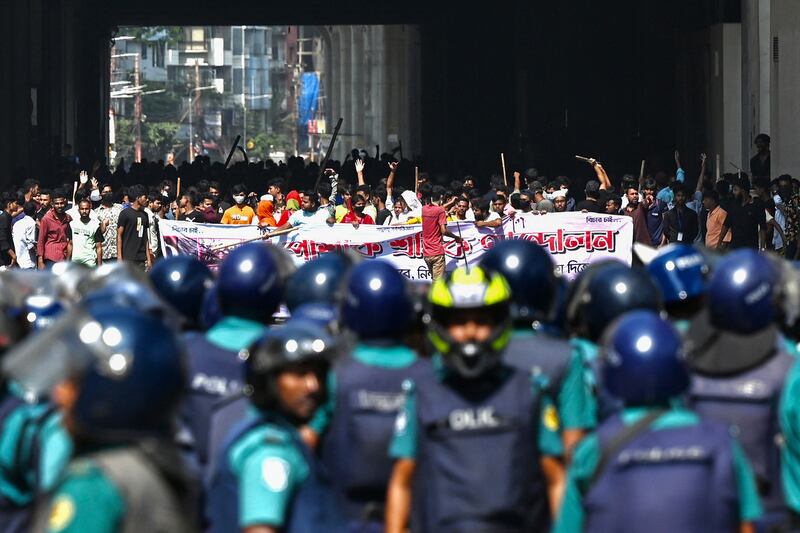Street protests by Bangladeshi garment workers who want higher wages have turned violent while hundreds of factories have shut down, crippling the industry that is an engine of the country’s export economy.
At least two people have been killed in street clashes with police since thousands of workers began striking on the outskirts of Bangladesh’s capital last week to demand that they be paid double their monthly salary. As many as 500 garment factories have temporarily closed, authorities and factory owners said Thursday.
Demonstrations that began last week in Gazipur and other industrial neighborhoods just outside Dhaka have spread to the capital as unions push for a monthly starting salary of U.S. $184 (20,360 taka), as opposed to the $94 (10,400 taka) proposed by factory owners.
“The longer it takes to announce a reasonable wage structure, the more the industry will suffer,” said Touhidur Rahman, a union leader who attended a meeting with the labor ministry on Thursday. “We’ve told the government that workers should be sent home with a positive message.”
Last week, representatives of factory owners proposed an increase from the existing $73 (8,000 taka) to $94, but workers’ representatives said inflation and the decline in the taka’s value had negated that increase.
In 2018, when the current minimum wage of 8,000 taka was fixed, that salary equaled about $100 per month. Workers’ leaders cite these statistics to argue that the owners’ proposal is equivalent to a pay cut.
“This means that not only are they unwilling to increase the wage, but they are in fact trying to lower the wage,” said Taslima Akhter, a prominent labor leader, writing in The Daily Star newspaper.
More than 80% of Bangladesh’s export products come from the garment industry where over 3,000 factories manufacture clothes for major Western brands such as H&M and Gap Inc.
The protests in Gazipur began shortly after the factory owners submitted their proposals to the wage board.
Two people, including a worker, died after protests began last week – a development that helped the protest spread across Ashulia, an industrial hub on the outskirts of Dhaka, and Mirpur, a neighborhood in the capital city.

Police officials said officers used tear gas and sound grenades to disperse thousands of protesting workers who occupied major streets in Mirpur on Thursday.
“We were forced to retreat to the alleys from the main street after the police lobbed tear gas at us,” Mohammad Hasan, a worker who participated in the blockade, told BenarNews. “Now, the police are chasing us in the alleys as well.”
Meanwhile, a police official told BenarNews that officers believed that opposition activists had joined the workers’ protest.
“The workers vandalized a vehicle in Mirpur,” said Shahidul Islam, assistant commissioner of the Dhaka Metropolitan Police. “We had information that the workers had intruders here.”
“Then we were able to remove them from the main road with a few tear gas shells and sound grenades on the orders of senior authorities. Three people have been detained for further investigation,” he said.
The workers’ protests coincided with an ongoing agitation by the Bangladesh Nationalist Party, which has demanded that a non-partisan government shepherd the election scheduled for early next year.
The BNP, which has called for a three-day blockade of transportation between major cities next week, voiced support for the workers, although the labor protests remain largely unrelated to the party’s political program.
Separately, the BNP-led agitation has resulted in the deaths of at least 10 people, including the party's activists and a policeman, since Saturday.
Begum Monnujan Sufian, the state minister of labor and employment, has labeled the proposal from the factory owners as “unreasonable.”
“In the last five years, workers’ salaries would have already increased to about 10,400 taka at a 5% annual rate as stipulated in the rules. Is this a worthy proposition?” she told reporters, referring to the owners’ proposal.
She urged workers to return to their jobs, pledging that the government would soon announce “an acceptable” wage structure while also warning that the BNP was inciting workers’ unrest.
Meanwhile, after a discussion with the government, factory owners said they would attempt to reopen their factories, noting protesting workers risk not getting paid if they continue to strike.
Faruque Hassan, the president of the Bangladesh Garment Manufacturers and Exporters Association, said that 50 more factories had shuttered on Thursday due to the worker walking off, bringing the total number of factory closures to about 500.
“We have asked factory owners to reopen all factories on Saturday. If there is still vandalism or if workers do not work, then there will be a shutdown as per Section 13 of the Labor Act,” he said.
The section refers to a provision in the labor law that permits unpaid factory closures caused by an “illegal strike.”
Garment industry alarmed
The labor unrest, coupled with the political agitation, has alarmed the country’s readymade garment industry, a pillar of Bangladesh’s economy.
“Two of my factories are located in Gazipur and Ashulia, and they are currently closed. I am unable to produce clothes on time due to the production disruption. Additionally, as political parties have called for a nationwide blockade, goods cannot be sent to the port for export,” said A. Matin Chowdhury, managing director of Knit Asia Limited.
“As a result, we may have to consider costlier air shipment, cancel orders or offer discounts to buyers.”
Last month, officials from 15 global apparel brands wrote a letter to Prime Minister Sheikh Hasina, pledging to implement "responsible purchasing practices" while urging her to consider inflationary pressures and cover workers' basic needs when introducing new wages.
